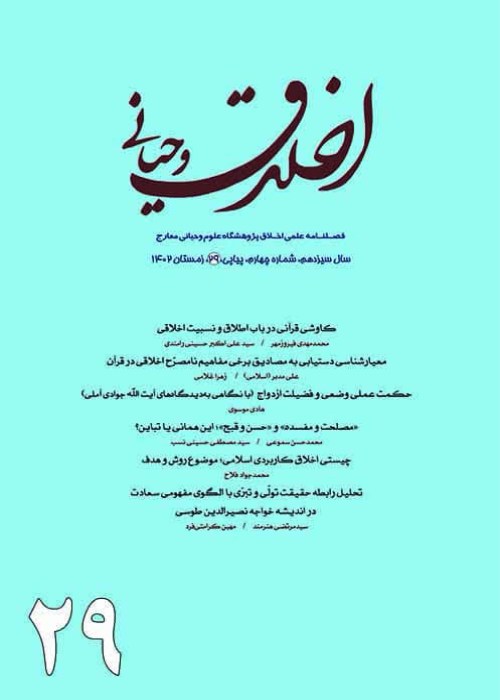Ambiguity in the Quantifiers of the Ethical Propositions in Quran and Hadiths
Author(s):
Abstract:
Some of the universal and absolute ethical propositions in the religious sources, despite their universal appearance, have quantifiers with limited scopes. Even there are instances where we know it for certain that the proposition is not universal, but it is apparently absolute or universal. This issue makes us suspicious even about the universality and particularity of other propositions. In the present study, for finding out the real quantifier of these kinds of propositions, we consult the interpretations of Quran and Hadith commentaries, as well as using philosophical and logical analyses. The results show a few possibilities: (1) the propositions are particular, which is against the appearance of the propositions and can be only applied when the proposition has no quantifier, but when there is a quantifier, this possibility is not applicable; (2) relinquishment to the most perfect person, which is dependent on the acceptance of the relinquishment rule; (3) the propositions being the expressions of the requirement not the total cause, i.e. considering these propositions in the category of duties, and their universality being due to their nature, not for all cases; (4) particularity after the acceptance of the conventional appearance of these text in absolute or universal forms; (5) predicating on the polarized levels of meaning. The third, fourth and fifth possibilities can be merged. When we know that universal or absolute propositions in religious texts are not always universal and that they may have been restricted or particularized or predicated on different levels of meaning or they are only expressing the requirements and the requirements may have been vanished, our interpretations of religious ethical texts become more accurate and the claims for universality go away. The universal appearance may be due to rhetorical objectives and for recommendation and warning about a certain issue. Even in the cases that the universal quantifiers are explicitly present, we consider the possibility that there can be a rhetorical objective and the correspondent meaning is not intended. Taking the rhetorical intentions into attention may make us free form dogmatic interpretations and claims for universality.
Keywords:
Language:
Persian
Published:
Revelatory ethics, Volume:7 Issue: 1, 2017
Pages:
51 to 66
https://magiran.com/p1747697
دانلود و مطالعه متن این مقاله با یکی از روشهای زیر امکان پذیر است:
اشتراک شخصی
با عضویت و پرداخت آنلاین حق اشتراک یکساله به مبلغ 1,390,000ريال میتوانید 70 عنوان مطلب دانلود کنید!
اشتراک سازمانی
به کتابخانه دانشگاه یا محل کار خود پیشنهاد کنید تا اشتراک سازمانی این پایگاه را برای دسترسی نامحدود همه کاربران به متن مطالب تهیه نمایند!
توجه!
- حق عضویت دریافتی صرف حمایت از نشریات عضو و نگهداری، تکمیل و توسعه مگیران میشود.
- پرداخت حق اشتراک و دانلود مقالات اجازه بازنشر آن در سایر رسانههای چاپی و دیجیتال را به کاربر نمیدهد.
In order to view content subscription is required
Personal subscription
Subscribe magiran.com for 70 € euros via PayPal and download 70 articles during a year.
Organization subscription
Please contact us to subscribe your university or library for unlimited access!


